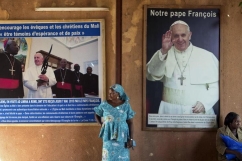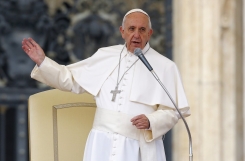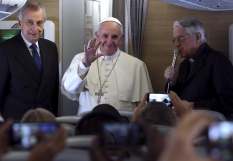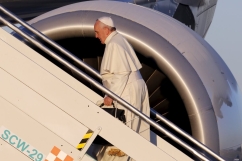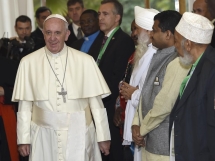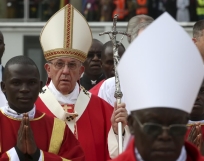Pope Francis began the final leg of his first African trip in Central African Republic where he will deliver a message of reconciliation and peace to a nation wracked by several years of violence between Muslims and Christians.
The visit to the former French colony will be the pontiff's first trip to a combat zone and his arrival is being welcomed by both majority Christians and the Muslim minority, who hope his presence can foster renewed dialogue and ease the violence.
The pope's plane touched down at around 10 am at the airport in the capital Bangui, where he was greeted by dignitaries, including the city's Archbishop Dieudonné Nzapalainga.
Dozens of children waved flags with the colors of the Vatican - yellow and white.
Ahead of his arrival, thousands of people lined the route Francis was due take into the city and hundreds of boy scouts were deployed to help control the crowds.
Bangui has seen a surge in clashes that have left at least 100 people dead since late September, according to Human Rights Watch, and security has been ramped up ahead of the papal visit.
France, which has around 900 soldiers deployed in Central African Republic, warned the Vatican earlier this month that the visit could be risky, and the pope's exact itinerary has remained uncertain even in the final days before his arrival.
Gabriel Ouamale, 33, who sells souvenirs, including t-shirts and umbrellas bearing the pope's image, in front of Bangui's cathedral, said sales have only picked up in the past week.
"There were people who doubted, who said he couldn't come due to the situation in the country. But the people now know he's coming," he said.
Hundreds of thousands of the city's residents are expected to turn out to greet Francis, who will be celebrating a mass at the cathedral later on Sunday.
Others will brave rebel and militia checkpoints to travel to Bangui from the rest of the country, and believers from neighboring Democratic Republic of Congo will cross the Ubangi River in pirogues to catch a glimpse of the pope.
Central African Republic's government is deploying around 500 police and gendarmes to secure the visit. More than 3,000 peacekeepers from the MINUSCA UN mission will also be deployed and French troops will be on alert as well.
General Bala Keita, MINUSCA'S force commander, said the mission aimed to head off any potential spoilers among the city's armed groups and had carried out operations to improve the security situation as much as possible.
"We have brought banditry and attacks on civilians to the lowest level possible, but Bangui is not secure. That's a fact," he said.
The Central African Republic leg of the Pope's trip is potentially the most hazardous. Dozens of people have been killed there since September in violence between Muslim Seleka rebels and Christian anti-balaka militias.
His schedule in Bangui ncludes a visit to a mosque in one of the most dangerous districts.
The country has been plagued with violence in recent years, including gender-based violence. In a report just released by Christian relief and development agency Tearfund, To Make Our Voices Heard: Listening to survivors of sexual violence in Central African Republic, survivors describe their experiences of rape, gang-rape and other atrocities, as well as the stigma they have suffered from within their own communities and families as a result of the shame associated with sexual assault.
The report includes a call to Christian and Muslim faith leaders to work together to show leadership and speak out against the negative values, behaviours and attitudes which sexual and gender-based violence are rooted in, including where faith teachings have justified or condoned these.
Additional reporting by Reuters










